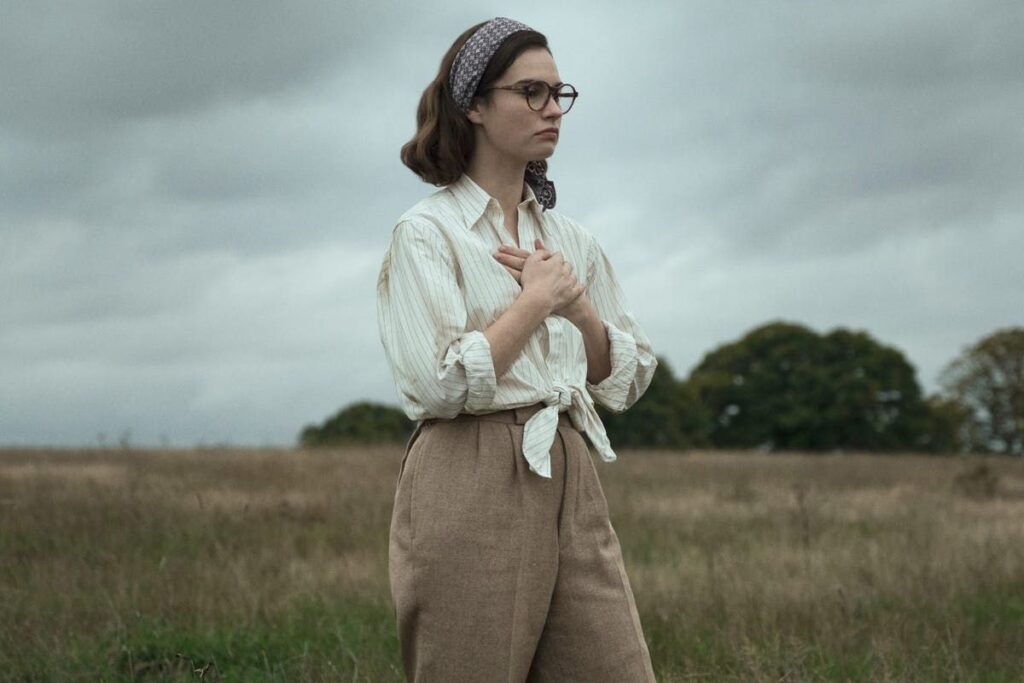
By Alice O’Donnell
Arts and Entertainment Editor
Picture the scene. Me, sitting at the dinner table. A steaming bag of Chinese yumminess in front of me. And the homepage of Netflix on my laptop.
I know I can’t be the only one who has this issue. The food’s ready, but there’s nothing lined up to watch. And then you’re faced with the impossible conundrum – waste time finding a good film to get into but allow your food grow cool, or pick a mediocre film that makes your piping hot meal not as enjoyable as you were hoping it would be, because you’re distracted by how mediocre the film you picked is.
Okay, first world problems I admit. But still.
Yesterday I found myself in that exact situation. The crisp dakgangjeong chicken with a side of dumpling – my meal very rapidly cooling as I desperately searched Netflix for some good viewing. Eventually, panicked now that my crispy chicken was more soggy chicken, I clicked on a near random film and tucked into my meal.
The Dig.
Although admittedly a dull name, The Dig gripped me from the get-go. Maybe it was the fact I had absolutely no idea what to expect from it, but I was captivated by the film as the plot developed.
The Dig is set in south-eastern England, where aged, single mother Edith Pretty (played brilliantly by Carey Mulligan) decides she finally wants the mysterious mounds on her estate excavated. And so begins The Dig.
The film is set in 1939, and does a truly terrific job at comparing the micro versus the macro. The film is solely focused on the dig, and yet the events of the outer world cannot help but leak into the story; the soldiers training nearby, the RAF flying overhead, radio announcements. There is something especially poignant about the excavation of an ancient burial mound while the world is on the brink of such a devastating war, of the creation of so many new nameless graves.
Ralph Fiennes plays Basil Brown, the sole excavator first hired by Edith Pretty. His performance is truly stand out, and I wouldn’t be surprised if he doesn’t bag an award or two for his role. Basil Brown is an extremely knowledgeable man, but has little formal education, and is clearly looked down upon by his well-to-do colleagues. He reminded me of my great-grandfather, with his soft country burr.
The relationship between Basil (a gentle working-class man) and Edith Pretty (with her wealth and upper-class sensibilities) is beautifully explored. The friendship formed between the two is really the core of the story.
I had never watched any work by Simon Stone before, but his directorial guidance on the film is masterful. There’s a delicacy in his scenes; a wistfulness of a time long-gone. At moments it almost felt like I was there, and was simply watching the characters react. At 1:19:17, Rory Lomax (the cousin of Edith, played by Johnny Flynn) looks around while the sun behind him sets. The moment can only last a few seconds, and in any other film probably would’ve been cut. It’s invaluable in The Dig though. There’s such a rawness to the scene, so atmospheric you actually feel like you’re there, beside Rory as the setting sun blinds.
The movie is full of moments like these, scenes of such delicacy, that despite only lasting a few seconds, they leave a lasting impact on the film.
The only criticism I would have on the film is the inclusion of a love story. Okay, so I love love stories as much as the next gal, and I adore a good love story. The Mia and Sebastians of film. But the one thing I cannot stand is the addition of a love story just so the film can say hey look, we have a love story!
I was disappointed in the romance element. Every other relationship in the film was delicately explored, and in comparison the romance felt heavy handed and rushed. It was jarring for something so blunt to be included in a film all about the unsaid, the unspoken.
It felt like a cheap tag on; like getting a full course meal and then the waiter brings a little plate of stale bread sticks. Like Huh? Why would you think this is necessary?
However, even though I didn’t love the love story, it’s not jarring enough to take away from the rest of the film. I really would recommend this film to anyone. The theme of death is beautifully explored, and in made poignant with the threat of war superimposed over the story, as well as the finds of the ancient burial mound.
If this film had to be boiled down to one question, it would be this. When we die, what do we leave behind?
Admittedly a bit of a heavy topic for a Chinese takeaway, but the film deals with it in such a way you’re left feeling invigorated, not drained by such a deep question.
It’s honestly been so long since I’ve watched a film of such calibre as The Dig. It reminded me of films such as Atonement and La La Land; and even if you’re not a history nerd like myself, I really would recommend this film. 4.5 out of 5 stars from me anyway and add the extra .5 if there’s a Chinese takeaway involved.